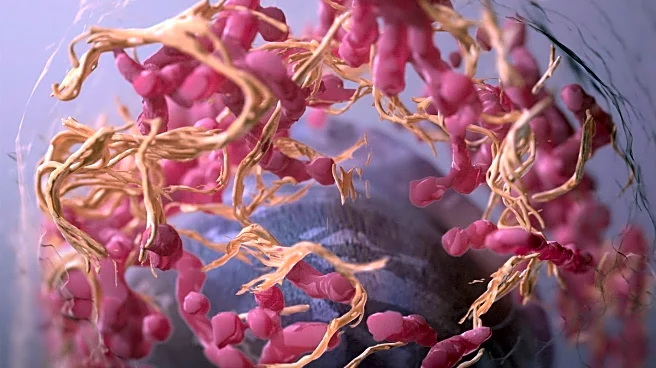What's Happening?
Researchers at the University of Pennsylvania have conducted a groundbreaking study demonstrating the ability to detect and eliminate dormant cancer cells in breast cancer survivors using repurposed drugs. The study, published in Nature Medicine, involved a randomized phase II clinical trial with 51 participants, where existing drugs successfully cleared dormant tumor cells from 80% of the patients. This approach aims to prevent the recurrence of breast cancer, which remains incurable once it relapses. The trial focused on breast cancer survivors who had completed treatment within the last five years and had clear scans. The study highlights the potential of targeting minimal residual disease (MRD) to prevent metastatic breast cancer.
Why It's Important?
This research is significant as it offers a promising strategy to prevent breast cancer recurrence, which affects 30% of survivors. By targeting dormant tumor cells, the study provides hope for reducing the fear of cancer returning, a common concern among survivors. The ability to intervene during the 'sleeper phase' of cancer cells could lead to improved survival rates and quality of life for patients. The study's success in using repurposed drugs also suggests a cost-effective approach to cancer treatment, potentially reducing the need for continuous and indefinite therapies that cannot completely eliminate cancer.
What's Next?
The research team is enrolling patients in two larger clinical trials, the Phase II ABBY and PALAVY trials, to confirm and extend the results of the CLEVER study. These trials are available at several cancer centers across the country. The ongoing research aims to provide breast cancer survivors with better options than the current 'wait and see' approach after treatment. The study's findings may ignite further research into targeting dormant tumor cells, potentially leading to new treatment protocols and improved outcomes for breast cancer patients.
Beyond the Headlines
The study raises ethical considerations regarding the use of repurposed drugs for cancer treatment, highlighting the need for careful evaluation of drug efficacy and safety. It also underscores the importance of personalized medicine, as identifying patients with dormant tumor cells could lead to tailored treatment plans. The research may influence future cancer treatment guidelines, emphasizing the need for early detection and intervention to prevent recurrence.









